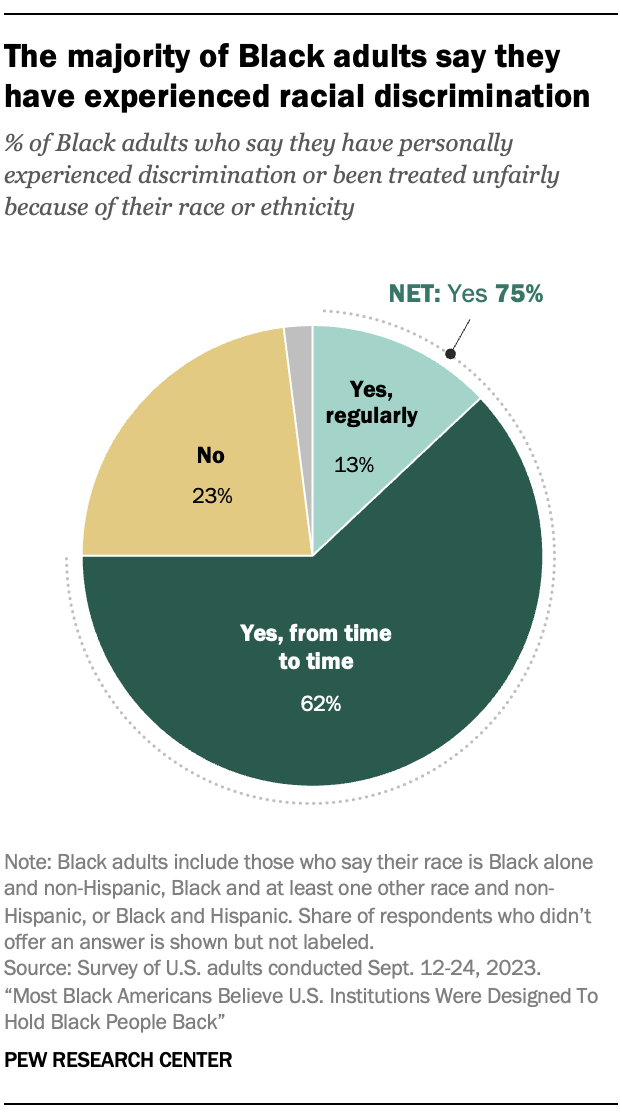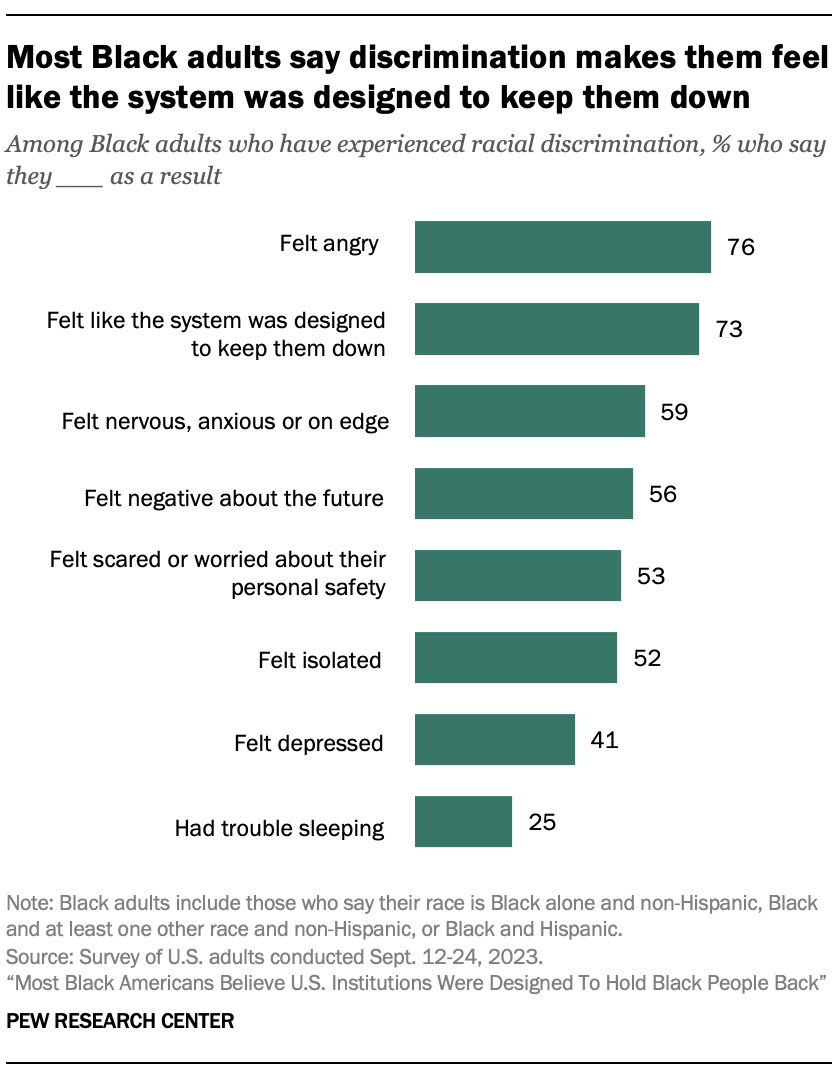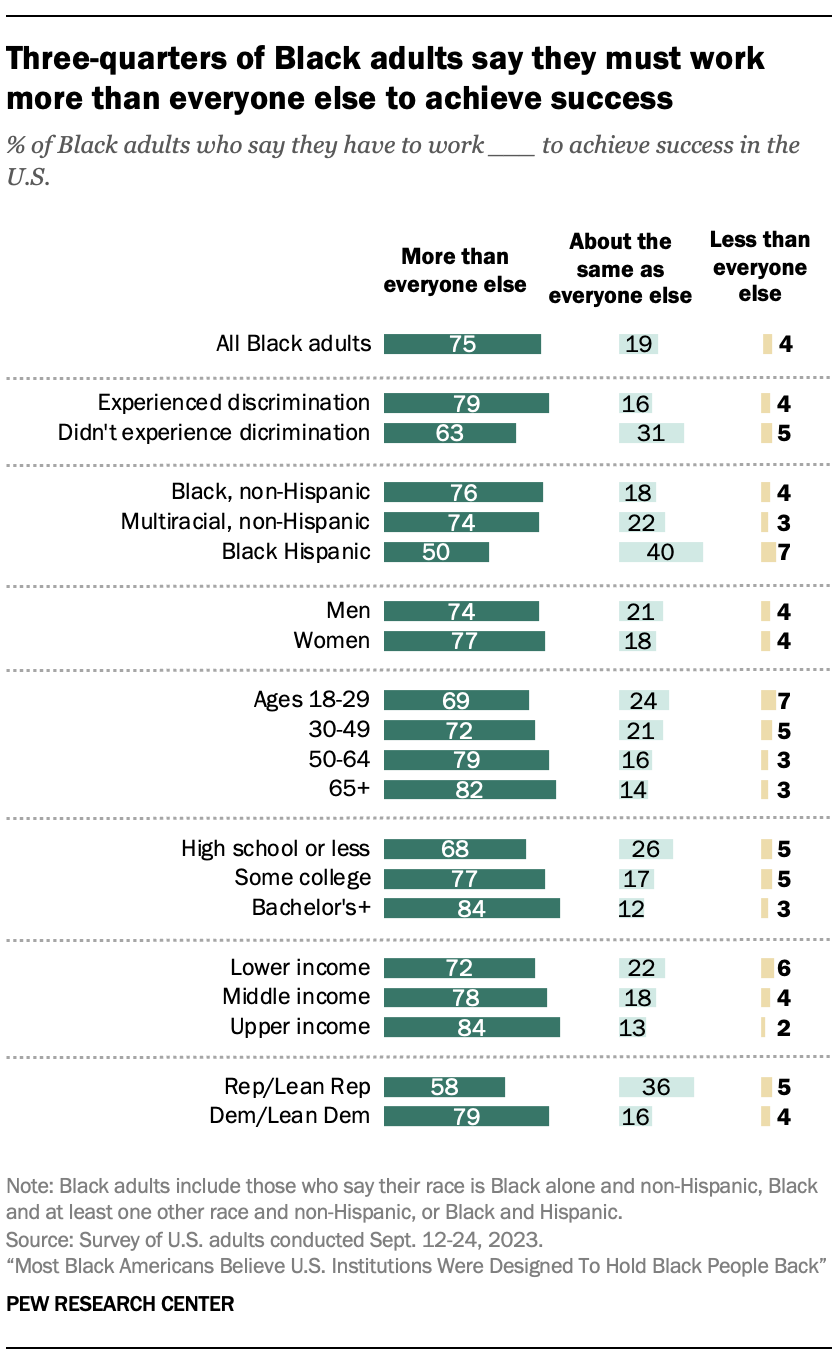Editorial note to readers
A version of this study was originally published on June 10. We previously used the term “racial conspiracy theories” as an editorial shorthand to describe a complex and mixed set of findings. By using these words, our reporting distorted rather than clarified the point of the study. Changes to this version include: an updated headline, new “explainer” paragraphs, some additional context and direct quotes from focus group participants.
Claudia Deane, Mark Hugo Lopez and Neha Sahgal contributed to the revision of this report.

Most Black adults say they have experienced racial discrimination (75%), either regularly (13%) or from time to time (62%). They say these experiences make them feel like the system is set up for their failure. Many also say Black people must work harder than everyone else to achieve success.
Most Black adults say they experience racial discrimination
Three-quarters of Black Americans say they have experienced racial discrimination, either regularly (13%) or from time to time (62%). Fewer say they have not been discriminated against because of their race (23%). Black adults differ slightly on this question by age, education, family income and where they live.
By age
Eight-in-ten Black Americans ages 65 and older say they experience racial discrimination, compared with smaller shares of Black adults under 30 (71%), ages 30 to 49 (76%) and 50 to 64 (75%). Black men 50 and older (82%) were most likely to say they experience racial discrimination when compared with men under 50 (73%) and Black women of any age (75%).
By education and family income
Most Black adults with at least a bachelor’s degree (82%) say they experience racial discrimination. Fewer of those with some college (77%) or a high school diploma or less education (70%) say the same. Black adults with upper incomes (80%) are more likely than those with lower incomes (74%) to say this.1
By region
Black adults who live in Western states (81%) are more likely than those who live in the Northeast (72%) and the South (74%) to say they experience racial discrimination. In the Midwest, 78% of Black adults experience this.
Black adults feel angry or undermined in the face of discrimination

Black Americans who experience racial discrimination have a range of reactions to this treatment. Large majorities say their experiences with racial discrimination made them feel angry (76%) and like the system was designed to keep them down (73%).
Smaller shares say they felt nervous or anxious (59%), negative about the future (56%), scared for their personal safety (53%), isolated (52%) or depressed (41%), or had trouble sleeping (25%).
By gender and age
There are a few key differences among Black adults in their reactions to racial discrimination. Black women under 50 (80%) are more likely than Black men under 50 (73%) and women 50 and older (75%) to say racial discrimination made them feel angry.
Most Black adults also say experiencing racial discrimination made them feel like the system was designed to hold them down (73%). Black men 50 and older (75%) are more likely than Black women in this age group (69%) to say this.
By birthplace, education and party
Black adults born in the U.S. (77%) are more likely than Black immigrants (65%) to say experiencing racial discrimination made them feel angry. And Black adults who went to college (80%), regardless of their degree level, are more likely than those with a high school diploma or less (70%) to say the same.
Black Democrats and Democratic-leaning independents (76%) are more likely than Black Republicans and Republican leaners (63%) to say their personal experiences with racial discrimination made them feel like the system was designed to hold them down. Still, majorities of both groups say racial discrimination makes them feel like the system was designed to hold them down.
Black adults say they must work more than everyone else to get ahead

Regardless of whether they feel systems are designed to hold them back, Black Americans generally view their road to success as more difficult than others’. Three-quarters of Black adults say they must work more than everyone else to achieve success. Far fewer say Black people must work the same as everyone else (19%) or less than everyone else (4%) to be successful.
By discrimination experience
Discrimination is still a key factor in how Black Americans think about their progress. Black adults who have experienced racial discrimination (79%) are more likely than those who haven’t (63%) to say Black people must work more than everyone else to be successful, though majorities of both groups share this view.
By ethnicity and age
Ethnicity and age also play a role. Non-Hispanic Black adults (76%) and multiracial Black adults (74%) are more likely than Hispanic Black adults (50%) to say Black people must work more than everyone else to achieve success. And the oldest Black adults, those ages 65 and older (82%), are more likely than those younger than 30 (69%) to say this.
By education, family income and party
Over eight-in-ten Black adults with a bachelor’s degree (84%) say Black people have to work more than everyone else to achieve success. Fewer of those with some college experience (77%) or a high school diploma or less education (68%) say the same. And Black adults with upper incomes (84%) are the most likely among income groups to say Black people must work harder than everyone else to be successful.
Political affiliation is also a factor in how Black Americans think about their progress. Black Democrats (79%) are more likely than Black Republicans (58%) to say Black people must work more than others to achieve success (though majorities of both groups say this).




